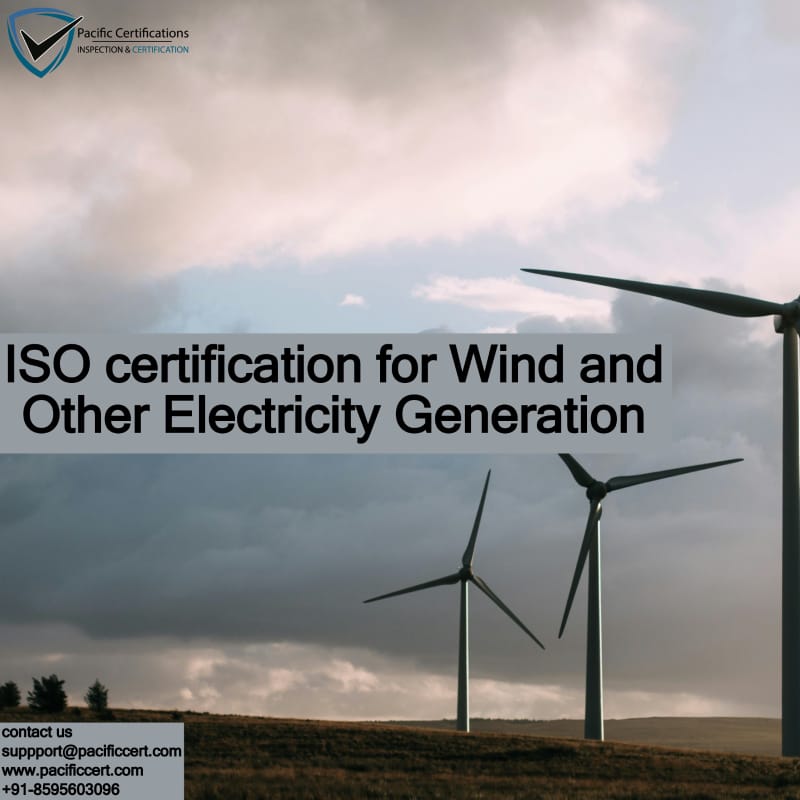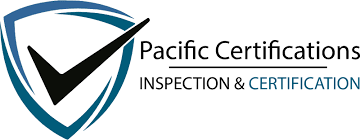ISO Certifications for Wind and Electricity Generation Companies, Requirements and Benefits

Introduction
Wind and electricity generation companies operate at the core of national energy systems, where reliability, safety, environmental responsibility, and regulatory compliance directly affect economic stability and public welfare. These organizations manage complex assets such as wind turbines, substations, transmission interfaces, control rooms, and power generation facilities that must operate continuously under variable environmental and grid conditions.
Electricity generation companies, particularly those focused on wind energy—face increasing pressure to deliver clean power while maintaining grid stability, worker safety, environmental compliance, and asset reliability. ISO certifications have therefore become an essential framework for wind and electricity generation companies to demonstrate structured operational governance, energy performance control, risk management, environmental stewardship, and long-term infrastructure resilience.
In power generation, sustainability only succeeds when reliability and control are built into every system.
Quick summary
ISO certifications provide wind and electricity generation companies with internationally recognized frameworks to manage quality through ISO 9001, energy performance through ISO 50001, environmental protection through ISO 14001 and ISO 14046, occupational health and safety through ISO 45001, asset management through ISO 55001, information security through ISO/IEC 27001, business continuity through ISO 22301, and renewable-specific performance guidance through ISO 61400-1 for wind turbines. These certifications help power producers improve efficiency, ensure grid reliability, manage safety and environmental risks, and strengthen confidence with regulators, investors, and utilities.
Applicable ISO Standards for Wind and Electricity Generation Companies
Below are the most relevant ISO standards applicable to wind farms and electricity generation operators:
ISO 61400-1 – Wind Turbine Design Requirements
ISO 61400-1 is a sector-specific international standard governing the design, safety, and performance of wind turbines. It addresses structural integrity, load assumptions, environmental conditions, and operational limits. For wind energy companies, this standard underpins turbine reliability, safety assurance, and regulatory acceptance.
ISO 50001:2018 – Energy Management Systems
ISO 50001 supports systematic monitoring and optimization of energy performance across generation units, auxiliary systems, substations, and grid interfaces. It is particularly relevant for utilities balancing renewable variability with efficiency targets.
ISO 55001:2014 – Asset Management Systems
Electricity generation companies rely on long-life, capital-intensive assets such as turbines, generators, transformers, and control systems. ISO 55001 enables structured lifecycle planning, predictive maintenance, and risk-based investment decisions.
ISO 14001:2015 and ISO 14046-1 – Environmental and Emissions Management
These standards help power producers manage environmental impacts, land use, noise, biodiversity considerations, and greenhouse gas reporting—critical for renewable licensing, ESG disclosures, and climate commitments.
ISO 27001: Information Security Management Systems (ISMS)
With increasing digitalization, SCADA systems, grid communications, and operational data must be protected from cyber threats. ISO/IEC 27001 provides structured controls for confidentiality, integrity, and availability of energy systems.
For more information on how we can assist your energy generation company with ISO certifications, please contact us at [email protected].
Click here to find out more applicable standards to your industry
What are the Requirements of ISO Certifications for Wind and Electricity Generation Companies?
Electricity generation companies seeking ISO certification must establish and maintain documented policies, procedures, and records aligned with the selected ISO standards. Key requirements include the following:
ISO 9001:2015 – Quality Management Systems
Establish a documented quality management system
Define generation, maintenance, and grid interface processes
Control operational procedures and corrective actions
Monitor performance and continual improvement
ISO 50001:2018 – Energy Management Systems
Establish an energy management policy
Identify significant energy uses and efficiency opportunities
Monitor generation performance indicators
Implement energy improvement plans
ISO 55001:2014 – Asset Management Systems
Identify critical generation and transmission assets
Plan lifecycle maintenance and renewal
Manage asset-related risks and failures
Monitor asset performance
ISO 45001:2018 – Occupational Health and Safety Management Systems
Identify hazards related to height work, electrical systems, and machinery
Implement safety controls and emergency response
Monitor incidents and improve safety performance
ISO 22301:2019 – Business Continuity Management Systems
Identify critical power supply functions
Develop contingency and outage response plans
Test and review continuity measures
Tip:Start by mapping your generation lifecycle—design, installation, operation, maintenance, grid connection, and emergency response—against ISO requirements to identify control gaps and align documentation with real operational conditions.
For further information on how we can assist your wind or electricity generation business with ISO certifications, contact us at [email protected].
What are the Benefits of ISO Certifications for Wind and Electricity Generation Companies?
ISO certifications are suitable for wind farm operators, independent power producers, renewable utilities, and electricity generation companies. Key benefits include:
Improved operational reliability and grid compliance, supporting uninterrupted electricity supply.
Enhanced energy efficiency and performance control, reducing losses and operating costs.
Stronger asset lifecycle management, minimizing downtime and unplanned failures.
Improved worker safety in high-risk environments, reducing incidents and liabilities.
Greater environmental and ESG credibility, supporting permits, financing, and stakeholder trust.
Improved resilience to outages and disruptions, ensuring continuity of generation.
Global electricity generation is undergoing rapid transformation as renewable capacity expands and grid operators demand higher reliability from power producers. Industry data shows that wind power capacity has grown by more than 50% globally over the past decade, while grid operators increasingly require documented operational, safety, and asset management systems from generation partners. Operators implementing structured asset and energy management systems report 15–20% reductions in unplanned downtime and measurable improvements in availability factors across wind assets.
Investment and regulatory trends also favor ISO-aligned energy producers. Energy regulators and financiers increasingly assess asset management maturity, emissions reporting, and continuity planning when approving projects or financing. Market forecasts project continued expansion of wind and renewable generation through 2030, with ISO 50001, ISO 55001, and ISO 14064 adoption accelerating as operators seek efficiency, resilience, and compliance. Certified generation companies consistently demonstrate stronger audit outcomes, higher investor confidence, and improved long-term operational stability.
How Pacific Certifications Can Help
Pacific Certifications, accredited by ABIS, acts as an independent certification body for wind and electricity generation companies by conducting impartial audits against applicable ISO standards. Our role is to objectively assess whether documented management systems and operational practices conform to international ISO requirements, based strictly on verifiable evidence and site-level records.
We support energy generation organizations through:
Independent certification audits conducted in accordance with ISO/IEC 17021
Practical assessment of generation operations, asset controls, and safety systems
Clear audit reporting reflecting conformity status and certification decisions
Internationally recognized ISO certification upon successful compliance
Surveillance and recertification audits to maintain certification validity
If you need support with ISO certification for your wind or electricity generation business, contact us at [email protected]or +91-8595603096.
Autor: Ashish
Ready to get ISO certified?
Contact Pacific Certifications to begin your certification journey today!
Suggested Certifications –
Read more: Pacific Blogs
